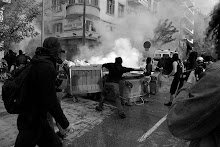from Italian review “Insurrezione” – novembre 1977,
translated from 'Parafulmine e controfigure', ed. Anarchismo
If we undoubtedly claim the wealth of violent and armed expressions of the movement (generalised theft and expropriation as critique of waged work, radicalisation of clashes in the streets, sabotage, etc.), we are convinced, on the other hand, that the field of violence cannot in itself constitute a qualifying moment, a moment, in other words, that characterises the new revolutionaries as such. «The impatience to use weapons at all costs today in reality is delaying the moment in which the proletariat as a whole will have recourse to arms, because it anticipates repression. Those who congratulate themselves in the stupid use of arms are not the revolutionary movement, but the rearguard of its theoretical and strategic conscience». (Manifesto handed out in Bologna 23 settembre 1977, signed: Ass. For the Epidemic of Contagious Rage).
In our opinion, it is precisely social decomposition to push towards totalizing choices – armed struggle as a specialistic and separate dimension – which, by reducing the complexity of the clash to a feud between gangs, remains in a field that capital can always manage for its own benefit. If, concerning the BR [Brigate Rossi] for example, we cannot prevent ourselves from feeling a feeling of sympathy for the measure in which they sometimes manage to ridiculise and beat the State in its own field, we don’t forget that their neostalinist program is full of militaristic ideology and has nothing to do with the project of the proletarian revolution.
And on the basis of the failure of the movement of ‘68 it is possible to understand the present wave of terrorism. When, at the beginning of the 70s, the perspective of a total revolution seemed to be moving away, a few groups considered it possible to destroy the State in a military clash. The incapacity to understand how no armed volontarism or other can take the place of the pace of the real movement, led to to a curious ideology that puts together elements of a naive rebellious tendency and ultrabolshevist traits, in a horrible pot-pourri. In the beginning, the armed groups at least obtained the aim of showing up the vulnerability of the State, all the same the rapid rationalisation of the police apparatus immediately rendered the repression more effective and, soon, their practice trasformed itself into a personal war, autonomised by a real struggle. Moreover, the typical slogan “strike the heart of the State”, hides the real objective, capital, which the State is only the phenominal manifestation of. Actually, the armed groups have become an obstacle to the development of the movement that they (BR) criticise as spontaneist and adventurist (!). These criticisms recall the lamentations of the official left, which these people only constitute the radical wing of. Independently of intentions and the revolutionary ardour of single individuals, we grasp in this kind of armed struggle the seeds of recuperation. Not only and not so much in the sense of the police-like cannibalisation, but in the reduction, the repetition, absolutely functional to power, of the revolution to a simple military question. To that we are opposing real war, war that crosses the whole social totality and does not let itself simply be reduced to the armed clash. It is true that the groups of the autonomia do not identify with the BR, but it is just as true that their acritical pushing towards the militarisation of the movement presents the same problems.
The State is clearly trying to push a large number of people into clandestinity.That reaches the objective of reducing the movement to its military dimensions, where power can still win, at least in this phase. Groups such as the Brigate Rosse believe they have found confirmation of their strategy. And it is significant that the recent period characterised by growing confusion and a kind of return to traditional militarism has been marked by the most stupid terrorism (Casalegno and Acca Laurentia).
It is obvious that the clandestine groups are now playing on the ambiguity between crises and revolution; between neostalinist management and radical transformation in the communist.
Subscribe to:
Post Comments (Atom)




No comments:
Post a Comment